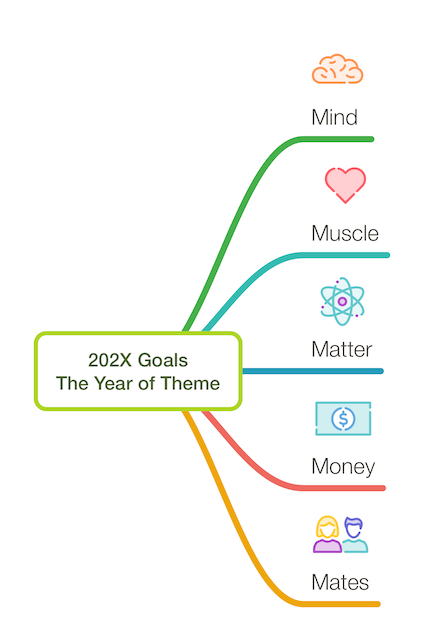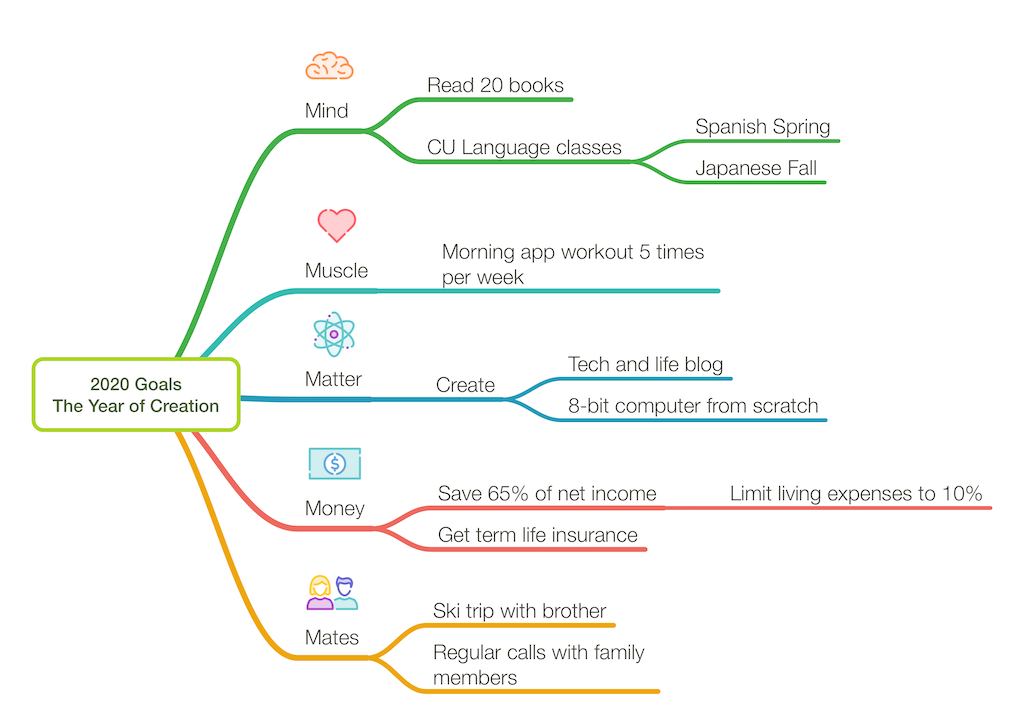The Unreasonable Effectiveness of Yearly Goals
New Year’s resolutions have a well-deserved reputation for being terrible. They’re often vague wishes for things you think might improve your life, whether it’s truly important to you or not. In their best form, a resolution has a structure—such as Specific, Measurable, Action-Oriented goals that are Realistic and Time-Bound (so-called “SMART” goals). These tend to have a better chance of success, but the rigid structure can sometimes feel overwhelming and not every change we want to bring to our life fits the format. Understandably, many people feel cynical about the whole idea of New Year’s and the soon-to-be-broken resolutions that come with it.
I like New Year’s. I acknowledge that it’s an arbitrary day and there’s no reason why we should choose this time over any other to make changes in our lives—but then, what in our life isn’t, on some level, arbitrary? Yes, there is no intrinsic significance about changing the Julian calendar year change to the next, but it’s just as good as any other day to do so. And because our culture treats the New Year with special significance as a time for reflection and planning, there’s an energy that lends itself to take stock and to plan the changes we want to make for the next year. From the perspective of the universe, it’s as meaningful (or meaningless) as any other day as we orbit the sun, but we can choose to make it meaningful and lend that meaning to promote changes.
And I like making goals for New Year’s. I choose the term goals over resolutions because of the bad taste associated with the latter, but there’s no real difference. The goals I make aren’t strictly structured. The only requirement is that it is a change I want to make in my life that I have control over. But the goal being some target isn’t the important part.
I’ve found merely the act of contemplating and writing goals for the upcoming year around the New Year to be unreasonably effective. At risk of sounding like a follower of The Secret (I’m absolutely not), I’ve found that simply through the process at the beginning of the year—not even reviewing them through the year—I’m shockingly likely to have achieved the goals by the end of the year.
When I was 20, I spent the New Year alone in my apartment. The previous year was rough; I had spent the last year struggling with the feeling of treading water to avoid drowning in anxiety. Christmas was spent at home among the tense energy of my parent’s impeding divorce. My graduation the following year loomed over me as I saw no real prospects with a degree in biology but no work experience or real interest in biology. I was extremely self-conscious about my persistent acne and weak frame. And like many lonely 20-year-olds, I desperately wanted to be in a romantic relationship.
Resolved to start moving in some direction, I spent New Year’s Eve and following day contemplating and writing goals to strive for in the year. Here are some of my goals I wrote that lonely night:
- Find an internship
- Bench press 200 lbs.
- “Defeat acne”
- Have a meaningful romantic relationship
That was the year I started going to an aesthetician for acne treatments; I began my career in software with an internship and mentors who changed my life; I drank a gallon of milk a day for a month (not recommended) and worked out constantly to break the 200 lbs. bench press barrier; and I started the relationship with the woman I would one day marry.
I had hung up the goals I had written in my room, but quickly forgot about them as they became part of the background. I only remembered to look what I had written when planning for the next New Year, and I was shocked to see that I had achieved most of the goals I had written out. Not at all one to believe in the “power of positive thinking” or anything, but I think at some subconscious level, the act of deliberately choosing and writing out goals gently shifts the decisions you make to give you a better chance to realize those goals. And that’s what had happened for me over and over.
I continue the tradition of writing out goals every year. I’ve changed the format a few times. But in general, I keep the goals short and the number of them limited. It’s not a wishlist; it’s a list of changes or achievements I think I can reasonably make within the year that are important and meaningful to me.
My current format is to organize goals into categories I call the “Five M’s” (alliteration always augments aspirations). These categories help me choose goals that are relevant to specific aspects of my life, rather than free-floating “nice-to-haves”. The Five M categories are:
- Mind—learning, study, and reading goals
- Muscle—physical activity and health goals
- Matter—goals for spiritual well-being and “things that matter”
- Money—financial goals; both spending and saving
- Mates—goals for developing relationships with friends and family
For the past few years, I organize the goals using a mind-mapping program called MindNode on macOS and iOS. This is what it looks like:
 Here were my goals for 2020, edited slightly to remove some more personal goals.
Here were my goals for 2020, edited slightly to remove some more personal goals.

Once again, I only looked at these goals a handful of the times throughout the year. I had intended to print it out and hang it somewhere I would see every day, but never did. When I checked in on my goals this month, I was surprised as always as to how many I achieved over this past year. One in particular was my goal to take a Japanese language class this fall with the University of Colorado-Boulder ALTEC language program. By this summer, I had completely forgotten I had written this. With the pandemic and the class being remote, I had nearly convinced myself not to sign up for the class and only decided to give it a go on the last day to register. Beyond checking off the goal, I am grateful I decided to do so. I had an excellent teacher and learned more than I expected to (one of my goals for the next year will be to continue learning Japanese). Had I not written that goal down a year ago and planted the seed in my subconscious, I’m convinced that I wouldn’t have signed up for the class and missed the growth it brought.
I am also so grateful that I hit my goal of organizing a ski trip with my brother. This is one where I knew I had chosen this goal for this year, and rather than put it off for the end of the year, I acted to check it off early. Good thing, too because our ski trip on the first weekend of March was followed 3 days later by the lockdown for COVID-19.
Some goals changed their form over the year: for example, working out with the seven-minute workout app 5 days a week became working out with the (much harder) Nike training app 3 days a week. I failed at a few (I still need to get term life insurance, whoops). But once again, it feels unreasonable to me that I somehow managed to achieve most of these goals without setting out each day to make them happen.
This next year I plan to change the format slightly. It’s less clear to me what specific goals I want to achieve as I’m largely satisfied at where I am in life, but I want to keep up with sustainable progress and add a few adjustments. Rather than specific goals, I want to try listing habits I want to develop or continue for each category of the 5 M’s. I’ll post my Five M’s for 2021 in a post next week, and discuss what the theme (articulated as “Year of _Theme_”) means and how it similarly influences progress through the year.